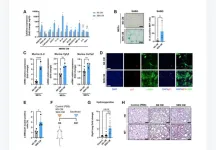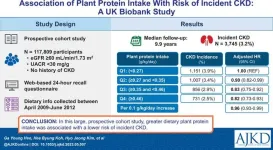(Press-News.org)
Sperm play a critical role in the creation of new life, delivering essentially half of the genetic material required.
The success of this process relies on the generation of a developmentally competent sperm cell, which is often determined by shape. Indeed, during in vitro fertilization, the “best-looking” sperm is selected to fertilize an egg.
However, how this optimal shape translates to proper sperm function is difficult to assess because of many confounding factors.
Researchers at the University of Michigan are now delving into the molecular-level details of sperm formation, with a particular focus on how abnormalities in this process might lead to male-factor infertility.
Unlike other cells in the body, sperm possess a unique characteristic—their genetic material is packed with proteins called protamines.
Protamines have been found in various living organisms such as plants, fish, and mammals, spanning hundreds of millions of years of evolution.
The significance of this protamine-based packaging system of sperm cells raises an intriguing question: why do sperm use protamines to package DNA instead of histones, which are employed by all other cell types?
To uncover the significance of protamines in reproduction, Saher Sue Hammoud, Ph.D., Sy Redding, Ph.D., Lindsay Moritz, Ph.D., Samantha Schon, M.D., and their team conducted an in-depth study of the molecular sequence composition of protamines to understand how variations in the protein effect function.
“We started looking at protamines because they are in many animal species and are also rapidly evolving, so there’s a lot of sequence variation,” said Hammoud, an associate professor of human genetics, obstetrics and gynecology and urology.
Most mammals have multiple types of protamines and these need to be maintained in well-defined ratio, and deviations in this ratio have been associated with infertility.
Conventional wisdom has it that protamines are particularly efficient at tightly packaging DNA into dense structures called chromatin because they are rich in arginine, a positively charged amino acid that strongly binds to the negatively charged DNA.
However, recent studies have shown that protamines also have non-arginine amino acids that are species specific and have unexpected post-translational modifications, that chemically change proteins after they are made.
This study, published in the journal Nature Structural & Molecular Biology, explores previously unrecognized features of protamines.
“The molecules that interact and package DNA are known to have positively charged features. What’s really beautiful about this work is it reveals other logic embedded in these proteins that we never really considered, other amino acids that are doing very important jobs as well,” said Redding, assistant professor of biochemistry and molecular biotechnology at the University of Massachusetts Chan Medical School.
Furthermore, what was intriguing was the presence of post-translational modifications on protamines, despite the fact that sperm are not transcriptionally active.
“The fact that protamines have all of these different modifications on them suggests that these modifications must have some function in chromatin packaging,” said Moritz, a postdoctoral fellow in the Hammoud Lab and co-first author on the paper.
Using mice, they analyzed a modified lysine residue specific to a mouse protamine and present in mature mouse sperm. Substituting lysine with an alanine amino acid (which cannot be modified) resulted in abnormally shaped sperm, impaired embryonic development, and reduced fertility.
What’s more surprising was replacing the lysine with a positively charged arginine did not correct the defective sperm packaging, meaning the interactions go beyond the charge of the molecule.
Male-factor infertility often lacks a clear cause, which highlights the importance of studying these modifications.
Noted Schon, assistant professor in the U-M Department of Obstetrics and Gynecology and co-first author on the paper, "I think these modifications are interesting as another avenue of research and identifying the cause of infertility, and the fact that it might play a role in the early embryo has huge significance as a potential diagnostic tool and post-fertilization for IVF."
The team hopes to next examine the mechanisms of sperm cell packaging in greater detail in the hopes of recreating the process completely in vitro.
Additional authors: Mashiat Rabbani, Yi Sheng, Ritvija Agrawal, Juniper Glass-Klaiber, Caleb Sultan, Jeannie M Camarillo, Jourdan Clements, Michael R Baldwin, Adam G Diehl, Alan P Boyle, Patrick J O'Brien, Kaushik Ragunathan, Yueh-Chiang Hu, Neil L Kelleher, Jayakrishnan Nandakumar, Jun Z Li, Kyle E Orwig
Paper cited: “Sperm chromatin structure and reproductive fitness are altered by substitution of a single amino acid in mouse protamine 1”, Nature Structural & Molecular Biology. DOI: 10.1038/s41594-023-01033-4
END
Technological advancements like autonomous driving and computer vision are driving a surge in demand for computational power. Optical computing, with its high throughput, energy efficiency, and low latency, has garnered considerable attention from academia and industry. However, current optical computing chips face limitations in power consumption and size, which hinders the scalability of optical computing networks.
Thanks to the rise of nonvolatile integrated photonics, optical computing devices can achieve in-memory computing while operating with zero static power consumption. Phase-change materials (PCMs) have emerged as promising candidates for achieving photonic memory and nonvolatile ...
New research reveals a type of monoclonal antibody already tested in certain forms of cancer may be a promising treatment in stopping the progression of amyotrophic lateral sclerosis, or ALS, a fatal neurodegenerative disease.
The study, led by scientists at Oregon Health & Science University, published today in the Proceedings of the National Academy of Sciences.
The study, involving a mouse model and confirmed in the tissue of human brains affected by ALS and donated after death, revealed for the first time that modulating immune cells can slow the progression of the disease. Previous research suggested a role for immune cells in ALS, but researchers this time used a high-throughput ...
A peer-reviewed study published in the Journal of Global Health analyzed data from more than 6,600 families with a child with a neurodevelopmental condition (NDC)—autism, attention-deficit/hyperactivity disorder, developmental language disorder, Down syndrome, Williams syndrome, and intellectual disability—from 70 countries, including the United States.
The study was led by Andrea Samson, associate professor of psychology at UniDistance Suisse and University of Fribourg, Switzerland, and Jo Van Herwegen, professor in developmental psychology and education at University College London’s ...
“These observations support that accumulation of senescent cells may contribute to fibrotic lung disease [...]”
BUFFALO, NY- July 31, 2023 – A new research paper was published on the cover of Aging (listed by MEDLINE/PubMed as "Aging (Albany NY)" and "Aging-US" by Web of Science) Volume 15, Issue 14, entitled, “Human senescent fibroblasts trigger progressive lung fibrosis in mice.”
Cell senescence has recently emerged as a potentially relevant pathogenic mechanism in fibrosing interstitial lung diseases (f-ILDs), particularly in idiopathic pulmonary fibrosis. In a new study, researchers Fernanda Hernandez-Gonzalez, ...
Plant-based diets confer various health benefits, including lowering the risk of cardiovascular disease and certain cancers. However, the relationship between plant protein intake and the risk of chronic kidney disease (CKD) remains unclear. This study led by Ga Young Heo aimed to investigate the association between plant protein intake and the development of CKD. Using the UK biobank study data, the researchers found that participants with a higher plant protein intake had a lower risk of developing CKD. This finding suggests that a higher dietary intake of plant-based protein may be beneficial for kidney health and provide insight into ...
CHAPEL HILL, N.C. – Cases of human papillomavirus (HPV)-associated cancers of the head and neck, known as head and neck squamous cell carcinoma (HNSCC), are rapidly increasing throughout the United States. Unfortunately, relatively little is known about the factors that contribute to these tumors and what makes some tumors more aggressive and treatment-resistant than others.
To determine why some patients respond better to radiation therapy than others, researchers in UNC School of Medicine’s Department of Otolaryngology/Head and Neck ...
WASHINGTON—The Endocrine Society and Matchbox Virtual Media are pleased to announce today that the organizations formed a joint venture that will bring exciting new opportunities for medical, healthcare, and scientific associations to better customize the experiences of their customers relative to producing meetings, organizing communities, and disseminating educational products.
The new joint venture will benefit from the Endocrine Society’s initial financial investments and its robust networking within the medical and scientific fields. Matchbox Virtual Media brings its proven platform, technologies, ...
JUPITER, Fla. — A new scientist joining The Herbert Wertheim UF Scripps Institute for Biomedical Innovation & Technology invents creative and efficient ways to build complex, potentially useful molecules, studying their activity so that compounds found in nature may eventually become useful products, such as medications.
Synthetic chemist and associate professor Masayuki Wasa, Ph.D., joins the institute from Boston College, where he was an assistant professor of chemistry. Synthetic chemists specialize in assembling larger molecules from smaller parts, like a child assembling a Lego spaceship from a basket of oddly shaped pieces.
But the work is far from child’s ...
At the NRG Oncology Summer Meeting on Thursday, July 20, 2023, at approximately 5:44pm EDT, Larry J. Copeland, MD passed the presidential gavel to Thomas J. Herzog, MD at The GOG Foundation, Inc. (GOG-F) Board of Directors meeting.
Dr. Herzog brings a comprehensive background in clinical trials, the integral business aspects and acumen to this important position. A practicing gynecologic oncologist and member of the Board of Directors of GOG-F, he has served as the Treasurer of GOG-F from 2014-2023 and prior ...
Embargoed for release until 5:00 p.m. ET on Monday 31 July 2023
Annals of Internal Medicine Tip Sheet
@Annalsofim
Below please find summaries of new articles that will be published in the next issue of Annals of Internal Medicine. The summaries are not intended to substitute for the full articles as a source of information. This information is under strict embargo and by taking it into possession, media representatives are committing to the terms of the embargo not only on their own behalf, but also on behalf ...





